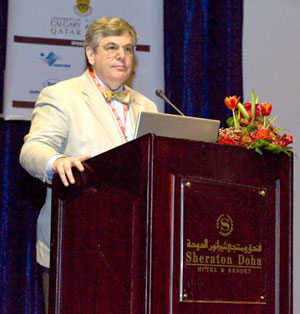Weill Cornell expert speaks at Pan Arab Rheumatology Society meeting
February,2008

Dr. Paget: Case discussions with HMC physicians were
"very impressive."
Closer links between Hamad Medical Corporation and the Hospital for Special Surgery, an affiliate of Weill Cornell Medical College in New York, are now on the anvil following a visit to Doha by expert in rheumatology, Dr. Stephen Paget.
Dr. Paget, who is Joseph P. Roth Professor of Rheumatic Diseases in Medicine, professor of medicine and attending physician at NewYork-Presbyterian/Weill Cornell Medical Center, and attending at the Hospital for Special Surgery, was a speaker at the 8th Pan Arab Rheumatology Society Conference, January 21-24.
“Wonderful collaborations have been developed, and I hope to come back again,” Dr. Paget said in a post-conference interview.
After giving a presentation on his special area of interest, the vasculitides, Dr. Paget participated as a guest expert in case discussions of two patients whose conditions posed particular challenges to the HMC health care teams.
During his visit to Doha Dr. Paget also toured WCMC-Q and met medical students. Clearly impressed by the Medical College, he noted that, as a member of the Committee on Admissions in New York - which selects all Weill Cornell medical students including those applying to WCMC-Q - it was a particular pleasure to encounter the Qatar-based students in person.
“It has been extraordinary to meet the students: They are energetic, earnest, bright, focussed and caring people,” he commented. “They are clearly equal to the medical students in New York.”
Challenging case discussions
Turning to the conference, Dr. Paget said the case discussions were “very impressive.” The cases- an autoimmune vasculitic reaction to interferon A prescribed for the treatment of hepatitis C, and a case of lupus nephritis – were complex to manage, he noted.
“I was impressed by how the physicians looked at the cases in exactly the same way that I did. They integrated the science with the care, treating the people in exactly the manner that I would have, and got very good outcomes. They seemed to be very thoughtful, caring and sensitive.”
In his presentation on the vasculitides, Dr. Paget looked at the signs and symptoms of a number of conditions, such as giant cell arteritis, polyarteritis nodosa and Wegener’s granulomatosis.
He described the methodologies for arriving at a differential diagnosis; treatment options, including steroids and immunosuppressive drugs; and the difficulty of balancing the use of these therapies, which may have unpleasant side effects, with control of such effects.
Explaining vasculitis
A group of systemic autoimmune illnesses, the vasculitides involve blood vessels, from the largest (the aorta) to the smallest (capillaries), depending on the disease in question. There is generalized inflammation of tissues and systems, with symptoms typically including aches and pains in joints, fever, skin rashes and weight loss.
If not diagnosed and treated in a timely way, such conditions may result in damage to the heart, lungs and kidneys; blindness; and bowel disorders.
Although relatively uncommon, the diseases are “profoundly life altering” and potentially life-threatening, Dr. Paget noted when interviewed.
Looking at the causes of the conditions, he said: “The general model in all of them is an intersection between genetics, some environmental or internal trigger and an alteration in the immune system.”
They may be associated with other diseases, such as hepatitis B or C, or cancer, or arise from treatment of another condition with drugs such as interferon A. In other cases, the trigger is a virus, infection or allergy.
An incomplete understanding of the etiology (causes) of vasculitis means that only the clinical manifestations are treated. As Dr. Paget noted during the case discussions, this may mean it is very difficult to control the ongoing inflammation seen in some conditions.
By contrast, in infectious disorders, we know the etiology - the bacteria or virus - and have been able to develop safe and effective antibiotics or anti-viral agents that destroy the causative agent.
New therapies offer brighter future
Worldwide research is currently focused on understanding the triggers for the vasculitides and, from there, a cure. Dr. Paget was hopeful that alternative therapies could appear in the next five to ten years, transforming the field for patients and physicians. The idea is to use genome-wide association studies to identify individuals and families who are at risk of developing a disease before the onset of symptoms, and to deploy small molecule therapies to block the cytokines, such as interferon, that are implicated in its onset.
For example, the Hospital for Special Surgery is now working on tools to block interferon alpha, a cytokine implicated in systemic lupus erythematosus.
“It is a profoundly important advance,” said Dr. Paget. “Biologic agents now in development can suppress this cytokine.”
The more personalized approach to medicine, with genetic and cytokine profiling of patients and carefully targeted treatments, could be as effective as the use of antibiotics in treating infection, Dr. Paget commented – but we are not quite there yet.
Report by Sylvia M. Ismail
